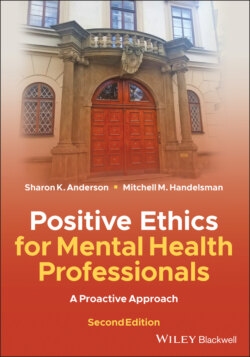Читать книгу Positive Ethics for Mental Health Professionals - Sharon K. Anderson - Страница 30
Journal Entry: Needs and Motivations
ОглавлениеWe now ask you to dig deep and explore some of the most personal elements of your core. Therefore, we suggest that you complete at least the first two parts of this entry in a quiet, private place where you can be honest with yourself.
Part 1: What personal needs might you be meeting by being or becoming a psychotherapist? When you think back to completing your application for graduate school, what were your top three motivations for applying—for wanting to be a therapist? Are these motivations still present? Since applying to graduate school, what other needs and motivations have become apparent to you that surprise you? What needs and motivations may you have that you haven’t thought of?
Be inclusive in your list of needs and motivations. You may want to revisit the list of secondary needs above as you make your list. When you list your motivations, include the noble ones you discussed on your application. Then, let your guard down to include the less noble needs and resulting motivations. For example, you may like the idea of (a) a nice office rather than a cubicle, (b) prestige and status, (c) being needed, (d) hearing other people’s stories, (e) demonstrating expertise or power in a relationship, and/or (f) saving others from the kind of family you had. Go beyond what you know—speculate about some needs and motivations that you might have even if you are not in touch with them at the moment. Remember Sharon’s story? If she had done this exercise during her training before internship, she might have uncovered the hidden need to understand family dynamics and been less likely to align herself with only one person of the couple.
Part 2: With your list of needs and motivations in front of you, think about how important each one is or might be. Rate each need and motivation on a scale from 1 to 5, with one being “just a little important,” and 5 being “absolutely critical to my being a therapist.” One way to make these judgments is to ask yourself how you would feel about being a therapist if a particular need or motivation were not satisfied. For example, if “having a big office with nice furniture” is on your list, what would it do to your desire to be a therapist if we told you (just for the sake of argument) that that motivation would definitely not be satisfied during your career?
